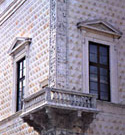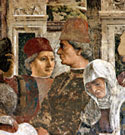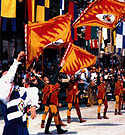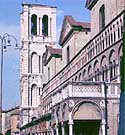
 |
|||||||
|
The origins of Ferrara are unknown. many important cities has grown in its area since the most anciente centuries. |
||||||
 |
The Palace of the Diamonds (photo), called in this way because the marble ashlar work was made of 8500 “diamonds”, was built by Biagio Rossetti for the Duke Ercole I d’Este in the years 1493-1504; it is now the seat of the National Picture Galler | ||||||
 |
The “Schifanoia” Palace (1385) is the seat of the Antique Art Museum of the city; the Palace of Ludovico il Moro (1495) is the seat of the National Archaeological Museum. There are many monuments to visit both in the city and in the province, “Casa Romei”, “Palazzina di Marfisa d’Este”, the “Mesola” Castle with the wood, the Pomposa Abbey and many many other monuments and interesting places. |
||||||
 |
Ferrara, city of the bicycles, organizes important events: The “Palio” in May; the Buskers in August; concerts and shows in the very beautiful Municipal Theatre. |
||||||
|
The art of cooking of Ferrara is extremely rich in important dishes: the eel of the Comacchio valleys, the “cappellacci” with the pumpkin, the rice produced in Jolanda di Savoia and cooked in a thousand of ways, the fish of the Adriatic, the frogs, the “pincini”, the “pampepato”, the “mandorlini” of the bridge (tasty crumbly almond biscuits). |
|||||||
 |
“Salama” for sauce of Ferrara. The “salama” has to be eaten cooked in winter with a potatoes’ cream and sliced cold in summer together with figs or melon. |
||||||
 |
“Pasticcio di maccheroni”. An antique recipe for a slightly sweet “maccheroni pasta” flavoured with a sauce of meat and spices and covered with short pastry. |
||||||
 |
Truffles. Do you know that Ferrara and its province offer you also the wonderful truffles? - High white (tuber magnamum): autumn. - Pale white (tuber borchii): spring. - “Scorzone” black (tuber aestivum): summer. Who says that the best truffles are those from Alba? Have you never tried a high white truffle cropped under the lindens in the province of Ferrara? Where can you find it? Unfortunately only by the local “tartufini” or the great restaurants of the city or province. |
||||||
Ferrara is therefore worth a stay and if you want to know more about it, please visit our site: www.comune.fe.it/turismo Acotec is… always one step ahead! |
|||||||


